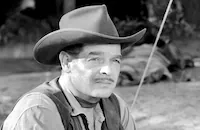They Made Me a Killer
Cast & Crew
William C. Thomas
Robert Lowery
Barbara Britton
Lola Lane
Frank Albertson
Elizabeth Risdon
Film Details
Technical Specs

Synopsis
Chicagoan Tom Durling, a mechanic who specializes in high-speed engines, drives cross-country to California after his kid brother is killed in a high-speed accident. Tom's money runs out by the time he reaches Santa Marta, so he plans to sell his souped-up jalopy. Before speaking with a car salesman, however, Tom meets Betty, a blonde who arranges for him to sell the car to her boyfriend the next day. The next morning, Tom meets Betty, her boyfriend, Jack Chance, and his brother Frank, in front of a bank. While Jack and Frank go inside, Tom and Betty wait in the car, and Betty chats with Steve Reynolds, a bank clerk who has a crush on her. Jack and Frank run out of the bank firing guns, and Steve, a policeman and a bank guard are wounded. Jack and Frank force Tom to drive out of town, but when Tom realizes that he is going to be framed, he tries to wrestle the gun away from them. Tom crashes the car and is left unconscious, gun in hand. Tom is later interrogated by District Attorney Booth, who believes he is guilty and finds his story ludicrous. Steve's sister June, meanwhile, quits her job as a teacher under pressure from the school board, and arrives in Santa Marta just as Steve dies from his injuries. Tom escapes police custody and seeks out June, offering to help clear Steve's name if she helps him clear his own. After retrieving Steve's and Betty's suitcases from their boardinghouse, Tom surmises that Betty is a waitress because of the doilies she used to line her suitcase. While the police search for Tom, he and June try to track Betty down by restaurant hopping. June eventually applies to work as a waitress at the Glen Grove Tea Room after hearing the proprietor, Ma, discussing Betty with Al and Roach, two friendly neighborhood policemen. At the end of her first day of work, June reports to Tom that Ma serves food to seemingly nonexistent customers. The next morning, Tom finds the robbers hiding in the tea room, but Ma disarms him and he is then kept at the restaurant to work as a handyman. Tom and June, who have fallen in love, pretend not to know each other, but secretly scheme to force Frank and Jack to admit they framed Tom, while secretly recording their conversation on Al's favorite jukebox record. Before Al arrives for a date with June, she and Tom are recognized by Ma's pal Joe, an inn owner who remembers them inquiring about Betty. As Tom now claims that he has arranged for Betty to be kidnapped, Jack and Frank take him and June looking for her. In reality, however, Tom has merely caused Betty's car to break down by putting sugar in the gas tank. While they are out, Al hears the recording on the jukebox and forces Betty to admit the truth when she returns. Al and Roach then go to Joe's inn, where Tom is defending himself against a beating. Joe and Jack are shot during the ensuing gunfight between the gang and the police, and Tom beats Frank until he submits to arrest. Roach reluctantly arrests Tom, knowing he is innocent of the robbery, but when Al asks June for a date, Tom assures him that June will be busy with him every night for life.

Director
William C. Thomas
Cast

Robert Lowery

Barbara Britton

Lola Lane

Frank Albertson

Elizabeth Risdon
Byron [s.] Barr
Edmund Macdonald
Ralph Sanford
James Bush

Paul Harvey
John Harmon
Boo Boo Scharf
Crew
Henry Adams
Howard Anderson
Dr. Gene Czukor
Owen Francis
Geoffrey Homes
Fred Jackman Jr.
James Knott
Harold Knox
Alexander Laszlo
Winston Miller
William H. Pine
Kae Salkow
Maxwell Shane
Ray Smallwood
Howard Smith
F. Paul Sylos
William C. Thomas
Glenn [p.] Thompson
Frank Webster

Film Details
Technical Specs

Quotes
Trivia
Notes
The working title of this film was No Escape. According to a Hollywood Reporter news item, some scenes were shot on location near Visalia, CA. According to a December 1947 article in the New York Times, the MPAA banned the re-release of this film and a number of other films produced between 1928 and 1947, due to their objectionable criminal content. The ban was part of a recent move by the MPAA to introduce new, stronger regulations "to prevent the glorification of crime and criminals on the screen."












